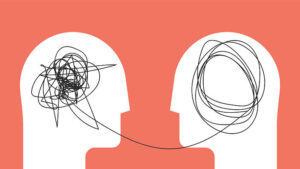The Three Minds

“So, what are the KPIs of counselling?”, “How do you know it is successful?”, “How long can it be effective for?” I asked a counsellor friend of mine 10 years ago.
Being a corporate professional that I was back then, it was second nature to me to evaluate things based on return on investments and tangible results, such as profit and loss, market shares etc.
Even so, this particular friend of mine, whom I had already known for 20 years then, smiled and patiently explained that the “Key Performance Indicators (KPIs)”, “successfulness” and “effectiveness” of counselling, perhaps should not be measured with a corporate mindset.
In fact, in some cases, there may even be “no sighted improvement” during a course of counselling service. Yet, the client might suddenly remember what his counsellor had suggested or mentioned to him during counselling. And this could guide this client to gain an insight that might change his perspective on a pressing situation or issue instantly.
With this new realisation, this client might have been able to make an appropriate decision, leading to a more balanced and happier life. If so, then this would be a “success” story for my counsellor friend!
Little did this friend know that he would help launch my career in counselling and psychotherapy shortly after!
Work-In-Progress
“When I can accept the fact that I have many deficiencies, many faults, make a lot of mistakes, am often ignorant where I should be knowledgeable, often prejudiced when I should be open-minded, often have feelings which are not justified by the circumstances, then I can be much more real.”, shared by Carl Rogers, a psychologist and among the founders of the humanistic approach (and person-centred approach) in psychology.
Similarly, I must say that being a professional therapist, I do not know everything. Neither am I immune to feelings, biases or perceptions.
Lao Tzu said “The further one goes, the less one knows.” (其出弥远, 其知弥少), while Albert Einstein mentioned, “The more I learn, the more I realise how much I don’t know.” I could not agree more with these two wise men.
The journey as a professional therapist is also one of lifelong learning with no visible destination. As I hope to be able to serve my clients more effectively and impactfully, this is also a personal journey of acquiring more knowledge on therapy and keeping my saw sharp. This is why I consider myself as a “work-in-progress”, seeking ways to improve myself as well.
To support my clients to the best of my capacity and capability, I adopt and practice “The Three Minds” during a therapy session.
My First Mind
The first mind is about focusing all my attention on my clients during a therapy session without making assumptions. To do this, clarification is the key.
Sometimes, the therapy location can influence our perceptions, like mine. Take an ex-client of mine when I was volunteering as a therapist at a substance addiction recovery centre. For this ex-client, I only came to realise my presumption at the sixth therapy session that, his addiction issue was not about consuming illegal drugs, but his over-dependence on legally prescribed ones!
With this understanding, I needed to re-formulate my intervention plans on the spot for him, as the legalised access to such prescribed medication imposed another type of challenge in the therapy process.
Another danger is to assume that my clients want validation from me. I was told by a client who had received therapy service at another centre before that, “Have you been trying too hard?” She was referring to my frequent affirmations and recognitions of her efforts in overcoming her stressors. It was simply a wake-up call to me to throw away my vanity to “win” her acceptance, as a fellow traveller on her journey of trauma-focused therapy!
I learnt that when clients engage my professional help, my ego has no place in establishing a therapeutic alliance. Instead, stay in the moment to identify counselling issues that have to be addressed properly at the right time, regardless of whether my clients have seen other therapists before.
My Second Mind
The second mind is all about being prepared for the unexpected during a therapy session. In particular, the immediate reactions and responses on the case conceptualisation and intervention plans.
Most of the time, I need to decide and formulate them on my feet, for driving my clients to the most suitable therapy direction. This may include ensuring them to take a sexual health screening for their own self-protection and to others, based on their sexual behaviours and habits.
A therapy centre’s service protocol could be different from other centres’, depending on its own vision and mission. Hence, a therapist may be expected to provide additional support to some clients, as part of the case management extraordinary needs.
For example, at a particular therapy centre which I served, there were a couple of times that I had to bring non-related clients for an anonymous HIV test in another centre nearby, during their respective therapy session. It was because they had unprotected sex with others some months ago. To ease their fear and anxiety, I accompanied them to do the test myself, though I knew I was perfectly safe. Fortunately, all results were negative for these clients too.
I also recognise that regardless of how pressed for time, I must conduct a proper therapy session closure for my clients.
In one of my sessions with a client with Bipolar Disorder, we had overrun on time and the next therapist was waiting to use the scheduled therapy room. Thus, I quickly summed up the session and vacated the room in a rush. A few days later, I got to know that she had experienced an emotional breakdown after the session.
Through this incident, I realised that if a therapy space is an issue, having a backup plan to conduct an appropriate session closure in a public location that allows short and confidential conversation, is the next best thing to do. This helps clients to feel that they are important to me and I genuinely care for their mental well-being.
My Third Mind
The third mind is one of the hardest yet the most important of “The Three Minds”. This is where I have to leave out my own set of values and perceptions, to have self-awareness and be non-judgemental during a therapy session.
In counselling speak, countertransference refers to a situation when a therapist transfers some emotions to a client during a therapy process. It means the client reminds the therapist of someone, some events or incidents or even objects. When such a situation occurs, a therapist needs to be conscious and mindful of the therapy process, as it may generate negativity to the psychotherapy outcomes.
My clients’ concerns can also sometimes affect me, as their therapist. In one particular couple therapy session, I noticed that I experienced countertransference on the taxing marriage relationship described to me. It reminded me of my parents’ marriage. At a suitable moment, I asked for a biological break. After taking a moment to compose myself through some emotional self-regulation techniques, I returned to the therapy room and continued the session, with a more balanced and objective mind.
I have learnt that when topics trigger my unhappy memories, I must be quick to recognise them, take immediate actions to observe and process my own emotions, while re-focusing my attention on my clients.
And when I lack that experience, I will need to have genuine empathy and compassion for my clients, no matter what are their issues.
A client was confiding in me about his deep grief and loss of his two pet cats which passed on not far apart in time. Being single, they were his “children”.
During the therapy session, I noticed that my empathy and compassion were somehow insufficient. After the client left, I sat on his chair and mentalised what he had gone through and what the two cats meant to him. Slowly, I started to comprehend why he used the words “fur kids”, “this family of three”, “dear babies” etc.
The act of changing seats helped me see things from my client’s perspective. It let me fully feel the loss of two “family members” within months, even if they were cats!
As mentioned, a professional therapist’s learning journey has no end. By applying “The Three Minds” approach for each therapy session, I am cultivating myself to be in a better position to assist my clients with their concerns. And by doing so, helping me gain more experiences to better support them in future too.
Now, back to my counsellor friend. Though I am not a “client” to him, I believe when he reads this article, he will be pleasantly surprised how his “casual” comments on counselling about 10 years ago, had unexpectedly made so much positive impact on me and my career direction!
I am grateful for his insight that inspired me to contribute in a small way, for transforming the lives of some of my clients! Isn’t this an exact reflection of his insight about counselling that had happened to me as well?
If you can’t do great things,
do small things in a great way.
Napoleon Hill
Note: As this article is mainly catered to general members of the public, the case conceptualisation, intervention formulation, discussion and terminologies used are deliberately simplified and presented for an easy reading, comprehension and relevancy.
Image: https://www.sbs.com.au/topics/voices/health/article/2021/03/15/what-it-means-when-we-chat-ourselves
This article is written based on Krish Phua’s greatest aspiration to be a mind healer, facilitating his clients to cultivate and explore “Inside Mind Insights” for improving their Wellness, Wholeness and Wiseness.
This article was originally published on www.oberdanmarianetti.com on 15 Mar 2022.







